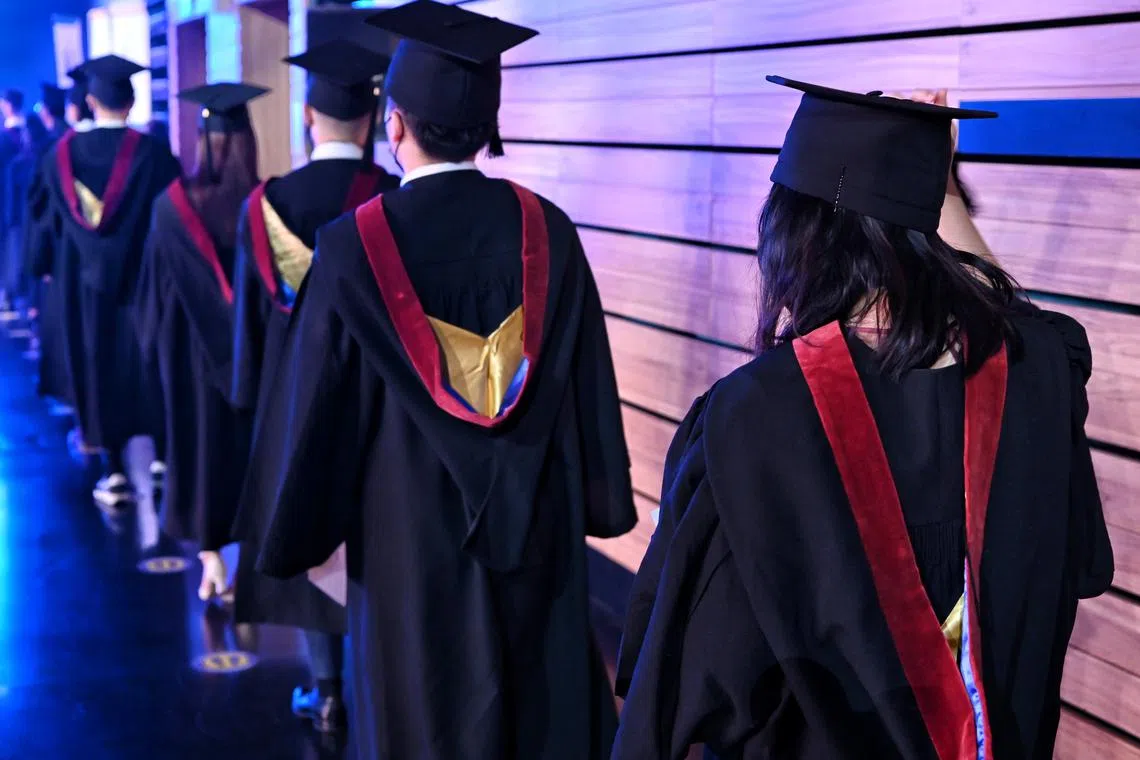SMU graduates to get transcript of co-curricular activities and skills learnt, starting in 2025
Sign up now: Get ST's newsletters delivered to your inbox

The co-curricular transcript will complement the academic transcript that students receive upon graduation.
ST PHOTO: KUA CHEE SIONG
SINGAPORE – Students from Singapore Management University (SMU) will soon have a transcript recording their co-curricular activities (CCA) and the skills they have learnt – a first among universities here – in a move to go beyond academic grades.
The graduating class of 2025 will be the first to receive this transcript, which was announced on Thursday at an SMU symposium on holistic education and skill sets employers are looking for.
At the event, SMU president Lily Kong said the transcript will indicate the extent to which graduates have demonstrated “learning outcomes”, or skills and knowledge, through their co-curricular activities.
These have three achievement levels – exposure, integration and transformation – to indicate a “progressively more impactful experience”, she said.
The learning outcomes include intellectual and creative skills; interpersonal skills; global citizenship; and personal mastery.
Students who show strong growth in these areas will earn digital badges showcasing their achievements. The badges can be used on their social media platforms – for example, in their LinkedIn profiles.
Professor Kong said the aim was to promote a culture of meaningful reflection, and guide students in deepening and documenting their learning. “In so doing, we empower students to enhance their self-awareness, reflect on what it is they are learning and articulate areas of personal growth.”
Information for the transcript is drawn from the Integrated Co-Curricular Management System, an online platform SMU piloted two years ago for students to document their learning experiences and submit reflections, and for instructors to provide feedback.
SMU said feedback collected by its co-curriculum development unit in September 2022 from more than 200 second-year students showed that about 97.5 per cent of them strongly agreed or agreed that a formal record documenting their co-curricular involvement should be issued by the university upon graduation.
Prof Kong said SMU has always encouraged students to engage in experiential learning.
“Oftentimes, the really valuable lessons in life take place outside of the classroom,” she said.
“In fact, SMU was the first local university to introduce both internship and community service as graduation requirements – 23 years ago at our inception. All our undergraduates are required to complete at least 10 weeks of internship and a minimum of 80 hours of community service. The vast majority of our graduates do more than that.”
Beyond these mandatory requirements, SMU students can choose from opportunities like global exposure programmes or project-based learning, or join student organisations that span the arts, sports, student leadership and special interest areas.
“However, the learning from these experiences should not be left to chance alone,” said Prof Kong.
“Rather, these experiences can be carefully and intentionally curated and aligned with clearly defined learning objectives.”
Education Minister Chan Chun Sing, who was the guest of honour at Thursday’s event at the university’s campus in Bras Basah, said SMU’s co-curricular transcript is “a part of the manifestation of our belief in a world that celebrates multiple pathways of success”.
“It also emphasises to students the range of life skills and qualities needed to succeed in the future, beyond academic grades. It signals to future employers the diversity of experiences and exposures our students have gone through that will add to their ability to learn and evolve at speed to be prepared for the future,” he added.
More than 200 industry partners, educators and students attended the symposium, which featured a panel discussion chaired by Prof Kong on the skill sets employers value.
The panel comprised Mr Chan; SMU chairman Piyush Gupta; Dr Michael Preston, executive director of Florida Consortium of Metropolitan Research Universities; and Ms Melissa Aratani Kwee, chief catalyst and former chief executive of the National Volunteer and Philanthropy Centre.
While recognising students’ co-curricular involvement and skills is a good move, Mr Gupta sounded a word of caution that institutions do not overdo it, as it may then become overly regimented.
Ms Kwee said one fear is that this exercise could become another source of stress for students, who may feel they have to do well in activities outside of the classroom on top of their academic performance.
Speaking to reporters, she said: “What’s important is for the individual to see it as an invitation to make sense of your own experiences, not to do this or that, or to fit a certain mould. That’s not the intent of this transcript.”
Ms Kwee added that the co-curricular transcript could help employers better assess candidates. “At the end of the day, you’re hiring a human being... You want to know his or her relational skills, how they are able to empathise or have diverse exposure.”
Second-year computing and information systems student Andrew Ng, 24, the president of SMU Caderas Latinas, a salsa dance club, said he hopes employers will look at co-curricular transcripts, which tell “another side of the story” and show students’ passion beyond academic areas.
“I don’t see it as another requirement to fulfil but about furthering your interest and growing as a person.”



